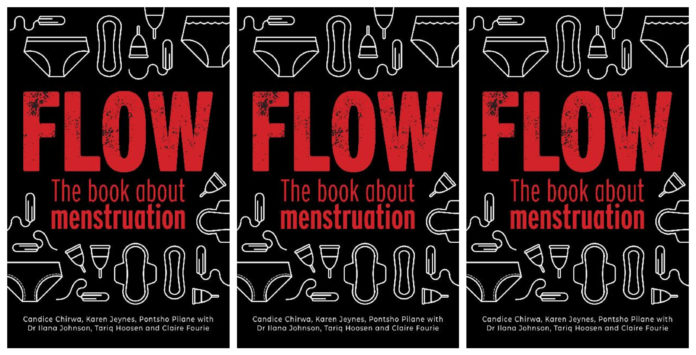Flow is a new book from Kwela Books. The book, Flow, will inform, educate, empower, and inspire all those who menstruate. Written by a dynamic group of authors; Candice Chirwa, Karen Jeynes, Pontsho Pilane with Dr Ilana Johnson, Tariq Hoosen and Claire Fourie, Flow is bursting with interesting bits, advice and guidance, a plethora of information and colourful facts about menstruation.
An extract from Flow is published below with permission from the publishers.
RELATED:
“It’s Only Blood” Fights Stigma And Shame Around Menstruation
Put a cup in it: the politics of period products
A lot of the time, when it comes to the debate on tackling period poverty, people’s go-to response is that the menstrual cup is the best product to use, because it lasts five years and all that is needed for hygiene is water.
That is factually true but using reusable period products that require water for cleanliness during the day is unsustainable for many. For some communities in South Africa, for instance, relatively clean water is only available to them ten kilometres from home. A lack of access to water is a safety risk for menstruators, not only biologically, but also physically, since it is unsafe to walk alone in unlit areas in order to seek out clean water. So the question is, are menstrual cups really a viable option where there is a lack of clean water, safe infrastructure and comprehensive education?
A lot of the time as a Menstruation Activist, I have to put aside my own opinions and judgements about young menstruators’ preferences regarding period products. Young people in the menstruation workshops my organisation hosts often resort to wanting to use the ‘skateboard’, aka the sanitary pad, because it does not require any form of interaction with their vagina. Why? Because society places a lot of importance on virginity. People with a vagina are told to preserve their virginity until marriage and thus believe that using period products like the tampon or menstrual cup will impact their purity and therefore their chances of marriage. This can cause a lot of pressure with menstruators resorting to using a sanitary pad out of fear due to societal perceptions.
I respect everyone’s experiences and desires regarding sex, and for some people, virginity is an important thing to maintain. However, it is just as essential to give people who menstruate the agency to use the menstrual care product that fits their needs and with which they feel comfortable. But I do want to clarify some points regarding whether menstrual cups affect virginity.
A lot of first-time menstrual cup users are afraid of using the product as it will break their hymen, which is often understood as ‘losing virginity’. It’s one of the biggest misconceptions around female anatomy that the hymen fully ‘seals’ the opening of the vagina.
The hymen is a membrane that sits at the opening of the vagina and partially covers it. It’s important to highlight that it only partially covers it because when the person starts menstruating, the menstrual fluid has to be able to pass through the vagina. That’s number one.
RELATED:
Tackling Menstruation Stigma Through Education
Secondly, different people have different types of hymens. The hymen can look very different from person to person. Some are born with a smaller hymen and some are even born without a hymen.
Thirdly, the hymen doesn’t have to be broken. As it is a membrane that partially covers the vagina, it does not have to be popped, ripped or poked. So, when inserting your period product, the period product will simply slide past the hymen. It might stretch it, but not rip or break it. FYI – the hymen can be stretched from doing yoga, dancing, riding a bike – simply doing normal life things.
Now when it comes to the menstrual cup affecting your virginity, let’s be clear: you only lose your virginity once you have sex. If your hymen was stretched because of anything other than sex, it does not mean you have lost your virginity in the most common understanding, i.e. Tlof Tlof.
And if you are a virgin, you are more than welcome to use the menstrual cup. Anyone can use a menstrual cup, or should at least try it out to see whether they’re into it. You shouldn’t be forced to use a period product dependent on the status of your virginity. You should be able to use a period product based on your needs.
There is a lot of work that is required in dismantling the culture and social elements associated with each period product. It is imperative that society understands period products from an objective point of view and not from a ‘virginity status’ point of view. We as menstruators need to be able to empower ourselves to dictate which period products work for our best interests and we also have a social responsibility in ensuring that our society is doing enough in providing the basics, like water, education and infrastructure, for other people who menstruate.
RELATED:
The List: Five organisations are advocating for menstrual rights in SA
Using a tampon, menstrual cup, period underwear, reusable sanitary pad, or disposable sanitary pad is up to you. And when it comes to our social programmes that seek to end period poverty, we need to do research before assuming that one period product will work for everyone in every community. But it’s also important to respect the agency of young menstruators and giving them choice in their menstrual care product.
Flow will be out online and in all bookstores on August 20 2021.









